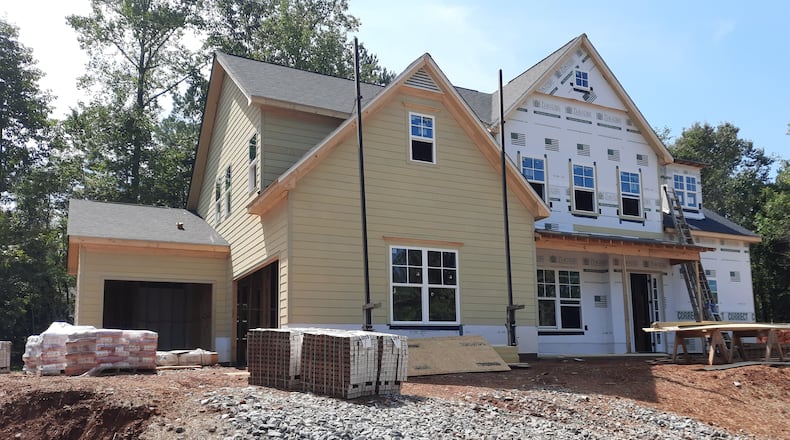Fewer choices, fewer sales, higher prices — the metro Atlanta housing market in December continued the trajectory it has followed since hitting a peak in number of sales in mid-2021, a trend that will likely persist this year, experts say.
In the core 12 counties centered on the city of Atlanta, there were 3,838 homes sold in December, 11.4% fewer than during the same month a year earlier, while the median price of a home sold rose slightly to $391,000, according to initial estimates by Georgia Multiple Listing Services.
“I see the drop-off, but 2022 was such a record year and the market just couldn’t sustain that,” said John Ryan, chief marketing officer at Georgia MLS. “We are still a very active market.”
About $26.5 billion worth of homes were sold during the year with one-third of the listings selling within a week and two-thirds of those listed selling within a month, he said. “Atlanta is a desirable place to live. But affordability is a challenge for first-time homebuyers.”
Metro Atlanta is the nation’s sixth-hottest market, according to a ranking this week by Zillow, a national online real estate marketplace.
The linchpin continues to be falling inventory, that is, the number of homes listed for sale.
In a balanced market, where buyers and sellers have roughly the same bargaining power, the number of listings typically represents six months of sales. Yet listings in the metro market last month were less than half that.
With the metro population growing and many younger professionals starting families, there are simply not enough homes — especially at the lower end of the market.
“This is the defining issue of our time,” said John Hunt, principal at MarketNSight, which tracks housing markets throughout the Southeast, during the firm’s recent conference. “We are witness to an all-out war being waged on housing affordability.”
Behind the inventory shortage are two problems. First, what Hunt called, “the lock-in effect.”
Potential sellers who would want to buy another home have to consider two big factors: Not only are interest rates much higher than when they purchased their current house, but the cost of homes has soared, too. So, for many, if not most, homeowners, the cost of changing homes is prohibitive.
The average rate for a 30-year mortgage crested at 7.79% in October, dropping to 6.61% as of Thursday, according to the Federal Home Loan Mortgage Corp., which buys mortgages.
That’s not nearly enough of a decline to draw many more sellers, said Eugene James, vice president at HomeTrust Bank. More than 90% of homeowners have mortgages at rates below 6%, more than 80% are below 5% and 60% are below 4%, he said.
And even a much lower rate would not offset the dramatic increase in home prices. The median list price of a home in metro Atlanta has increased 33% in the past five years, according to Realtor.com.
But the other half of the inventory problem is new construction. While homebuilding is more energetic than a decade ago, it doesn’t come close to making up the difference between supply and demand.
During the housing boom between 2001 and 2007, builders were putting up nearly 50,000 new homes a year. With the burst of that bubble and the Great Recession, construction collapsed. The region went years with nearly no new homes built, even as the population continued to grow.
Building has never approached previous highs, James said. “We need to be building at least 40,000 homes every year and we are averaging half that.”
Construction is crimped in a number of ways, said Kristen Jones, owner of Re/Max Around Atlanta.
Builders in metro Atlanta must abide by zoning laws that often prevent construction of smaller homes or denser developments. Moreover, the cost of homes they build has to account for rising land costs, labor shortages and material costs, she said.
“While lack of supply is a challenge, the bigger challenge is the lack of supply in lower, affordable price points, (meaning) under $350,000,” Jones said.
That is unlikely to change anytime soon.
Making plans, purchasing lots, obtaining permission and actually building homes can take years. And the short-term change that is most likely would be a further drop in mortgage rates, but that might not change the market balance much, Jones said.
“When rates do drop, we anticipate an increase in active listings, but we also anticipate an increase in buyer demand,” she said. “While we may see more inventory hit the market, we will also see more competition for those listings.”
That will keep driving prices higher, she said.
Atlanta area housing market by the numbers
Metro Atlanta housing, 2023
Units sold: 56,161
Compared to 2020: -18.3%
Value of homes sold: $26.5 billion
Median sales price: $391,000
Median days on market before sale: 16
Selling at or above list price: 54% of listings
Nation’s best housing markets in 2024
Typical mortgage payment with 5% down
Buffalo, N.Y. $1,792
Cincinnati, Ohio $1,959
Columbus, Ohio $2,177
Indianapolis, Ind. $1,944
Providence, R.I. $3,288
Atlanta, Ga. $2,701
Charlotte, N.C. $2,688
Cleveland, Ohio $1,556
Orlando, Fla. $2,806
*Statistics for 12-county region centered on the city of Atlanta
Sources: Georgia Multiple Listing Services, Zillow
About the Author
Keep Reading
The Latest
Featured



